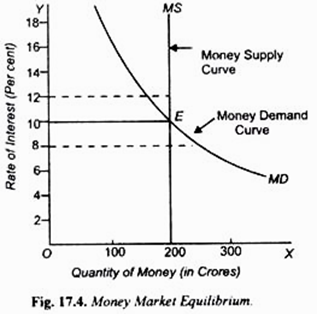Here is an example graph of Money Market Equilibrium
The chain effects when interest rate is 8% are :
Excess Demand for Money => So, People would sell Bonds => Bond Prices goes Down => Interest Rate Goes up to 10% to achieve Equilibrium
I am understanding the chain effects, But I am very confused in this thing.
Say, at the 8% rate of interest, Money Demand = $225
----> People want to hold $225 in their pockets
Now Money Supply as we know is fixed at $200
----> Only this much, i.e $200 is available in their Pockets
Then how is it that People can sell Bonds (Which will lead to Chain Effects) to get 225 in their Pockets?
Where is this extra 25 coming from if we only have $200 in currency in our economy?
Please enlighten me as I think, what am I am understanding the Demand for Money means and how it works has some holes in them.
Thanks in Advance
